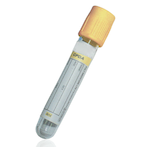Alkaline Phosphatase (ALP)
Specimen Volume
1mL blood (~250uL serum)Specimen Transport
Not applicable
Sample Preparation
Centrifuge on arrival
Turnaround Time
24 hoursSample Processing In Laboratory
No special requirements
Sample Stability
7 days at 2-8°CGeneral Information
Alkaline phosphatase (ALP) in serum consists of four different structural genotypes: liver‑bone-kidney, intestinal, placental and germ cell variants. ALP is found in hepatocytes, osteoblasts, leukocytes, the kidney, spleen, placenta, prostate and small intestine. Isoenzyme separation is carried out in the laboratory using electrophoresis when requested if ALP elevated and gamma glutamyltransferase (GGT) normal.
A rise in ALP occurs with all forms of cholestasis, particularly obstructive jaundice. It is also elevated in bone disease e.g. Pagets disease, hyperparathyroidism, rickets and osteomalacia, as well as fractures and malignant tumours. High ALP activity is found in children and adolescents because of the increased osteoblast activity related to bone growth - increases in bone ALP of 3-4x the adult range can be seen during this time. Increases above this requires further investigation.
Patient Preparation
None
Notes
EDTA contamination relating to order of blood draw decreases ALP activity.
Reference Range
Adult males and females: 30-130 U/L (Pathology Harmony)
Source of Reference Range
Roche diagnosticsSpecifications
-
EQA Status:
UK NEQAS for Clinical Chemistry
- EQAS Scheme: Yes








